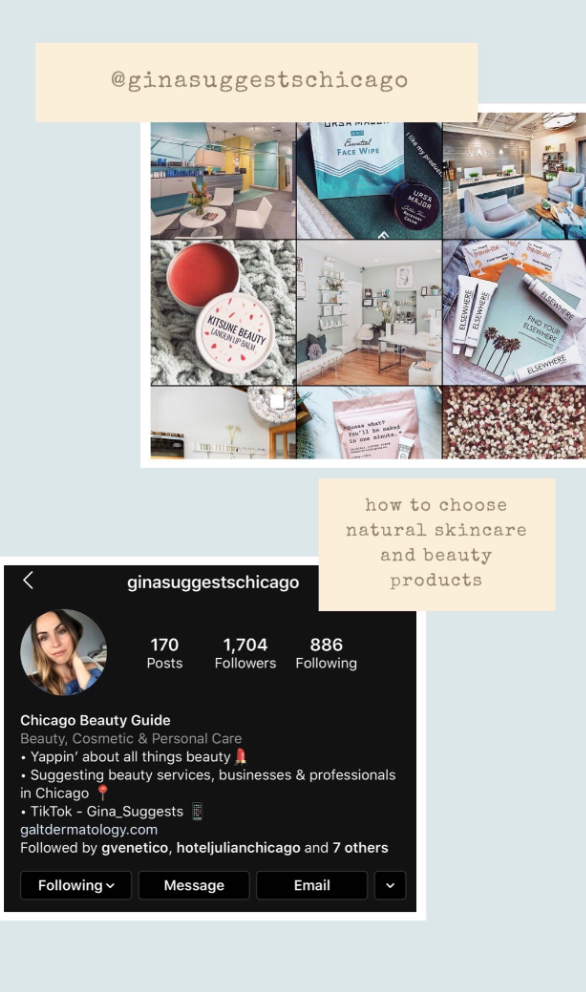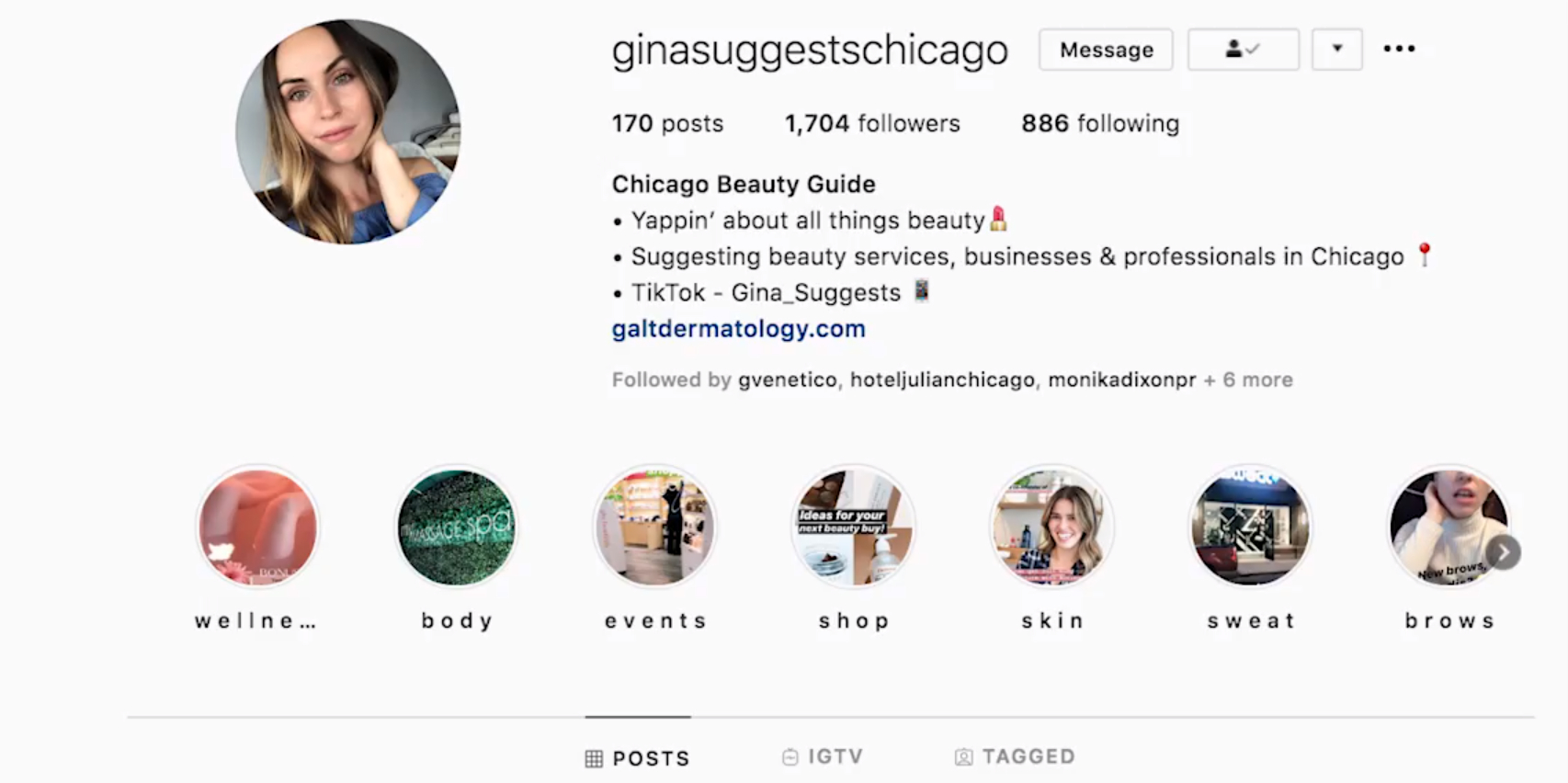This piece was aired at 14 East’s virtual live storytelling event on the theme of wilderness in May.
With multiple skincare and beauty brands to choose from, finding the best one for you can be a challenge. Consumers are more likely to research the ingredients in their beauty products and the practices of the brand than in the past.
According to Graham’s Natural Alternatives, natural ingredients could make your skin glow. Natural ingredients aid in skin protection from the sun and are overall more gentle on the skin. Beauty products with unnatural ingredients could cause breakouts and skin irritation.
Another common issue with beauty brands is whether they test on animals or not. Per the National Anti-Vivisection Society, there are over 80,000 chemicals that we do not know the potential toxicity of. Gina Venetico is a beauty influencer in Chicago and has an Instagram page called @ginasuggestschicago. Venetico suggests some of her favorite natural beauty products, promoting ongoing sales and discounts from small businesses and local businesses, and gives lots of advice on skincare.

Joey Cahue, 14 East
One question consumers might have is about the price. Beauty and skincare products range, but some products can be expensive. It’s understandable if people shy away from these natural gems because they don’t want to break the bank. Venetico explained what shelling out a few extra dollars could get you.
“I think when you go the natural route, you need to go for higher quality, aka more expensive, products to ensure there are no filler ingredients,” Venetico said.
She says it’s important to look at the ingredients list to see if the ingredient you’re buying is at the top of the list. For instance, if she’s buying rosehip oil, she wants it to be the first or second ingredient.
“If it’s not the first or second ingredient, it means the product is diluted with other ingredients,” Venetico said.
One downfall or concern people have about natural beauty or skincare products is if they’re not as strong as clinical products they would get at a pharmacy or from their dermatologist.
Venetico described this as “different strokes for different folks,” but she likes to experiment and meet in the middle.
“What I think we’ll see more of in the future are clinical brands becoming cruelty free, like natural brands are,” Venetico said.
It may be hard to go cold turkey and transform your entire beauty and skincare collection to cruelty free, but it’s something many should consider.
According to the Humane Society International, approximately 100,000 to 200,000 animals suffer and/or die every year due to animal testing. The animals involved in tests are rabbits, guinea pigs, hamsters, rats and mice.
A typical cosmetic test involves testing the product on the animal’s eyes and skin to see if they’re irritated. The common excuse for brands that are still testing on animals is that they are using new ingredients. When testing new ingredients, this means brands are unsure of how someone will react to the ingredient. Brands want to make sure it’s safe for the public to use, but they may go about this by testing the new ingredient on an animal. Drugstore brands are commonly at fault for these hazardous practices.
“Many drugstore or high-end brands outsource their testing of products to China, which has not had cruelty-free practices in the past,” Venetico said.
High-end brands are at fault, too. Not always for animal testing, but the distribution and packaging of their products aren’t always sustainable.
“I’d love to see high-end brands take a more eco-friendly approach in terms of how they package their products or how they give back to fighting climate change, preserving wildlife and the humane treatment of animals,” Venetico said.
Are natural beauty and skincare products just a sign of the times? According to a survey on Statista done in 2017, 43 percent of millennials leaned more towards buying natural skincare products. Venetico’s comparison matches these results.
“I’m happy to spend the extra couple dollars for a body wash brand I know has high standards of ethics. But someone like my mom wouldn’t think twice and would reach for the best bargain and not take into account the brand’s ethics,” she said.
Columbia College graduate Michelle Waclawik always tries to “go natural” when buying skincare products not just for herself, but for the world around her.
“I opt for natural skincare and beauty products for a few reasons as I know they are better not only for me but for the world around me,” Waclawik says.
Waclawik lives a vegan lifestyle. To her, this means not wearing or eating animal products, as well as not purchasing from brands that test with animals.
“A brand’s ethical practices are very important to me. Therefore, yes, if I was buying a face wash and found out the company tests on animals, I would automatically stop using it. I am a vegan, therefore, before making purchases, I always ensure that the company or brand is not testing on animals.”
Waclawik believes in getting enough sleep, a proper diet, workout routine and drinking enough water are all helpful steps in maintaining a good skincare routine.
Elementary school teacher Abby Naranjo has a busy schedule, but still makes time for her skincare routine. She said she has acne-prone skin and tries to buy from brands with fewer ingredients. She has a few favorite products.
“My favorite natural skincare product is the Superfood Cleanser by Youth to the People. It is gentle enough that it will not break me out, it’s not oily, and it leaves my skin feeling fresh and clean,” Naranjo said.
Making a drastic change like transforming your entire cosmetics and skincare collection won’t happen overnight, but educating yourself on brands that participate in healthy testing practices, use natural ingredients and are sustainable is a great way to start.
Next time, when you’re reaching for a product on the shelf that you’re eager to try or if you’re adding stuff to your online cart, be sure to check out the ingredients in your products. Not only do some products have harmful ingredients for your skin, but they’re also just as harmful for animals and the environment.




NO COMMENT